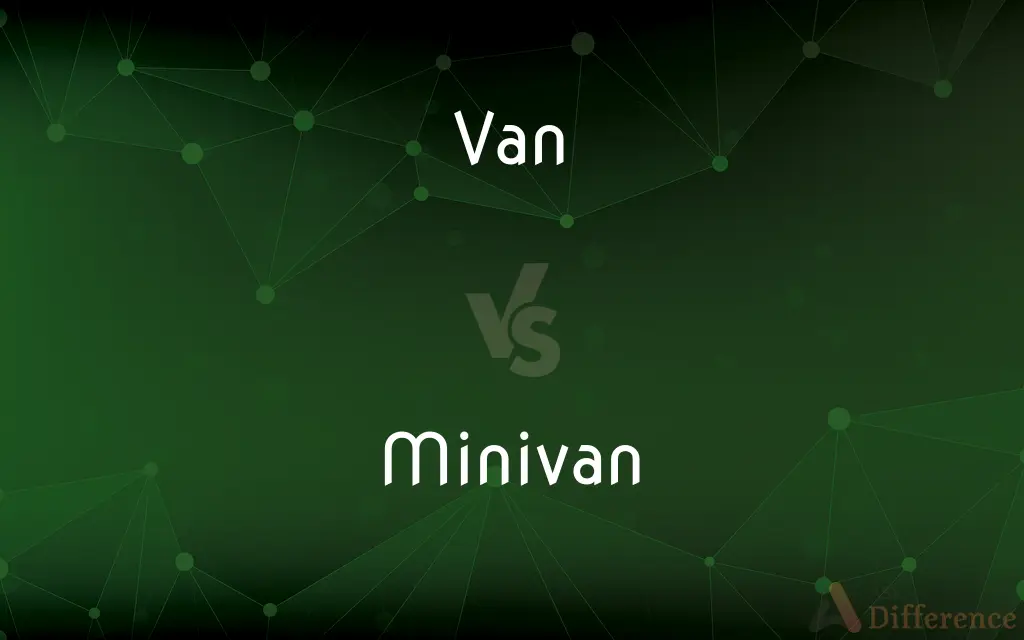Van vs. Minivan — What's the Difference?
By Tayyaba Rehman — Updated on October 9, 2023
A van is a larger vehicle often used for transporting goods or groups of people; a minivan is a smaller, family-oriented vehicle with passenger comfort in mind.

Difference Between Van and Minivan
Table of Contents
ADVERTISEMENT
Key Differences
Vans and minivans, while both being vehicles designed for specific purposes, differentiate in size, design, and primary usage. A van is traditionally larger, designed to haul equipment, goods, or numerous passengers. Its body is more squared, often with minimal windows along the sides, serving commercial and transportation industries. On the other hand, a minivan is crafted with families in mind.
Minivans are typically smaller than full-sized vans. They prioritize comfort, featuring spacious interiors tailored for family journeys, with easy access through sliding doors. Vans, however, may not have such conveniences, as their structure emphasizes cargo capacity.
The cultural and social associations with vans and minivans differ. Vans often conjure images of delivery trucks, shuttle services, or tradespeople with their equipment. Minivans, contrastingly, are linked with suburban family life, school runs, and family vacations.
Another distinguishing feature is their driving experience. Given a minivan's design and target audience, they are more likely to come with family-friendly features like rear-seat entertainment systems, more storage compartments, and advanced safety features. Vans, focusing more on utility, might lack such amenities.
To summarize, while both vans and minivans serve to transport people or items, their design philosophy diverges based on their intended primary use: vans for broader commercial or large group transport and minivans for family-centric purposes.
ADVERTISEMENT
Comparison Chart
Primary Use
Transporting goods, equipment, or groups
Family transportation
Size
Typically larger
Smaller, family-sized
Design
More squared, fewer windows
More rounded, more windows
Cultural Association
Commercial, work-related
Family, suburban
Features
Cargo space, utility-focused
Family-friendly, comfort-oriented
Compare with Definitions
Van
Van refers to a larger transport vehicle.
The delivery company used a van to transport the packages.
Minivan
Minivan provides passenger comfort.
The minivan had rear-seat entertainment for the kids.
Van
Van is a vehicle designed for carrying cargo.
The tradesman loaded his tools into the van.
Minivan
Minivan is a family-oriented vehicle.
She bought a minivan to accommodate her growing family.
Van
Van can transport multiple passengers.
The tour company used a van to accommodate all the tourists.
Minivan
Minivan often features sliding doors.
He easily loaded the groceries through the minivan's sliding door.
Van
Van is often used in commercial settings.
The florist drove the van filled with fresh flowers.
Minivan
Minivan is smaller than a traditional van.
The family preferred the minivan for its compact size and comfort.
Van
Van's design focuses on utility over comfort.
The moving company's van was spacious enough for all the furniture.
Minivan
Minivan is designed for suburban lifestyles.
The parents chose a minivan for daily school runs and family trips.
Van
A van is a type of road vehicle used for transporting goods or people. Depending on the type of van, it can be bigger or smaller than a truck and SUV, and bigger than a common car.
Minivan
Minivan (sometimes called simply as van) is a North American car classification for vehicles designed to transport passengers in the rear seating row(s), with reconfigurable seats in two or three rows. The equivalent classification in Europe is the M-segment, more commonly known as an MPV (multi purpose vehicle) or a people carrier / mover.
Van
An enclosed boxlike motor vehicle having rear or side doors and side panels especially for transporting people.
Minivan
A van designed primarily for carrying passengers, typically having rear seats that can be removed for loading cargo.
Van
A covered or enclosed truck or wagon often used for transporting goods or livestock.
Minivan
A small van.
Van
Chiefly British A closed railroad car used for carrying baggage or freight.
Minivan
A large and spacious passenger car, typically with five or seven seats and sliding rear doors
Van
The vanguard; the forefront.
Minivan
(ambitransitive) To travel or transport in a small van.
Van
A wing.
Minivan
A small box-shaped passenger van; usually has removable seats; used as a family car
Van
A winnowing device, such as a fan.
Van
To transport by van
Vanned the horses to the racetrack.
Van
To drive or travel in a van
Vanned around the country.
Van
A covered motor vehicle used to carry goods or (normally less than ten) persons, usually roughly cuboid in shape, longer and higher than a car but relatively smaller than a truck/lorry or a bus.
The van sped down the road.
Van
(British) An enclosed railway vehicle for transport of goods, such as a boxcar/box van.
Van
(dated) A light wagon, either covered or open, used by tradesmen and others for the transportation of goods.
Van
(aerospace) A large towable vehicle equipped for the repair of structures that cannot easily be moved.
Van
Clipping of vanguard
Van
(mining) A shovel used in cleansing ore.
Van
A fan or other contrivance, such as a sieve, for winnowing grain.
Van
A wing with which the air is beaten.
Van
(transitive) To transport in a van or similar vehicle (especially of horses).
Van
Of law enforcement: to arrest (not necessarily in a van; derived from party van).
Van
(mining) To wash or cleanse, as a small portion of ore, on a shovel.
Van
The front of an army; the first line or leading column; also, the front line or foremost division of a fleet, either in sailing or in battle.
Standards and gonfalons, twixt van and rear,Stream in the air.
Van
A shovel used in cleansing ore.
Van
A light wagon, either covered or open, used by tradesmen and others for the transportation of goods.
Van
A large covered wagon for moving furniture, etc., also for conveying wild beasts, etc., for exhibition.
Van
A closed railway car for baggage. See the Note under Car, 2.
Van
A fan or other contrivance, as a sieve, for winnowing grain.
Van
A wing with which the air is beaten.
He wheeled in air, and stretched his vans in vain;His vans no longer could his flight sustain.
Van
To wash or cleanse, as a small portion of ore, on a shovel.
Van
To fan, or to cleanse by fanning; to winnow.
Van
Any creative group active in the innovation and application of new concepts and techniques in a given field (especially in the arts)
Van
The leading units moving at the head of an army
Van
A camper equipped with living quarters
Van
A truck with an enclosed cargo space
Common Curiosities
Can a minivan carry as much cargo as a van?
Typically, vans have more cargo space than minivans, which prioritize passenger comfort.
Why are minivans often associated with families?
Minivans are designed with features and space that cater to family needs, making them popular among family users.
Can minivans be used for commercial purposes?
Yes, some businesses might use minivans for deliveries or as service vehicles, especially if passenger comfort is a priority.
Are all vans used for commercial purposes?
No, while many vans serve commercial needs, some are also used for personal or group transportation.
Why do minivans often feature sliding doors?
Sliding doors provide easier access, especially in tight parking spaces, making it convenient for families.
Are vans harder to drive than minivans?
Vans, being larger, might be more challenging to maneuver in tight spaces than minivans, but it largely depends on the driver's experience.
Are minivans safer than vans?
Safety varies by model and design, but many minivans come equipped with advanced safety features targeting family protection.
Why are vans more squared in design?
The squared design maximizes cargo space, aligning with the van's utility focus.
Can both vans and minivans come as electric vehicles?
Yes, both vans and minivans are available in electric versions as the automotive industry evolves.
Do vans generally consume more fuel than minivans?
Due to their larger size and weight, vans might consume more fuel than minivans, but this varies based on the specific model and engine type.
Can you fit more passengers in a van than in a minivan?
Generally, vans can accommodate more passengers, especially if they're designed for group transportation.
Are minivans considered less stylish than other cars?
While some might view minivans as less sporty or sleek, they are valued for their functionality and comfort.
Can vans be converted into mobile homes or campers?
Yes, many people convert vans into campers or mobile homes, given their spacious interiors.
Is the cost of maintaining a van higher than a minivan?
Maintenance costs vary by model, usage, and age, but larger vehicles like vans might incur higher costs due to their size and function.
Are there luxury versions of minivans?
Yes, several brands offer luxury minivans with high-end features and finishes.
Share Your Discovery

Previous Comparison
Grate vs. Great
Next Comparison
Wasted vs. DrunkAuthor Spotlight
Written by
Tayyaba RehmanTayyaba Rehman is a distinguished writer, currently serving as a primary contributor to askdifference.com. As a researcher in semantics and etymology, Tayyaba's passion for the complexity of languages and their distinctions has found a perfect home on the platform. Tayyaba delves into the intricacies of language, distinguishing between commonly confused words and phrases, thereby providing clarity for readers worldwide.













































